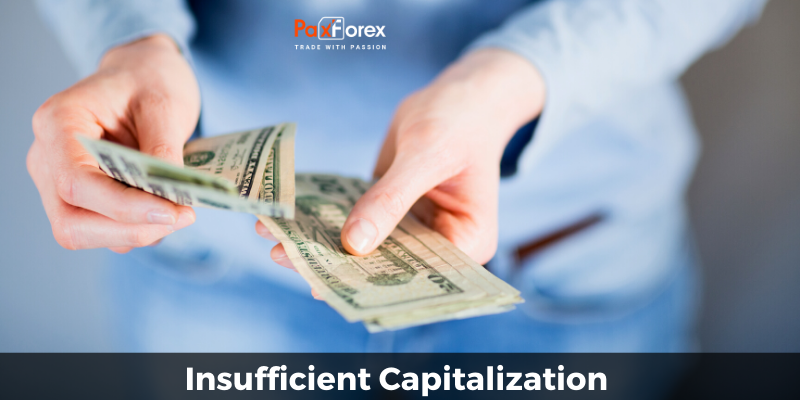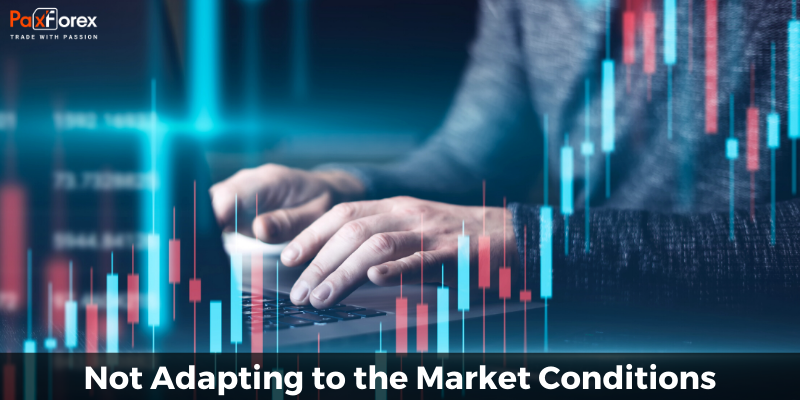
As a rule, after a failure, many people tend to blame everyone but themselves for their problems. They are unwilling or unable to admit their guilt for actions or omissions that have led to negative results.
Traders are no exception, always being able to put the responsibility for their actions in trading on someone else shoulders. Probably such behavior is more common among traders than among representatives of any other profession. The reason is the low percentage of those who achieve stable success, as well as the fact that trading is an individual type of activity. That is why those who are used to teamwork when they come to Forex are not always able to take responsibility for their actions.
In the beginning, trading seems to be quite a simple type of activity, where you can earn a lot of money at the touch of a button. Buy cheap, sell expensive - not a big deal. But in the process of work, the emotions that lead to elementary mistakes start to come into play. And the trader begins to lose money. In such cases, many people usually start to look for the guilty. And they blame everyone for their unsuccessful trades: broker, analysts, news, stars, etc. So, today we will discover the very roots of all the trader`s mistakes that doom trading to a failure and will answer to the question why do Forex traders fail.
Overtrading
Overtrading is opening transactions on the exchange without any competitive advantage, and even without any explanation. Basing on the experience, we can say that in most cases, it happens because of insufficient capitalization and addiction. The first one is apparent since having $100 on the account traders are crazy about increasing the balance as fast as possible. As for the trading obsession, it is the most popular reason for overtrading and inevitable loss as a result. Now we will discuss it in detail.
Insufficient Capitalization

As we all (hopefully) know, you need money to make money - with 0 capital profit will be the same. And here comes the most attractive feature of Forex trading - leverage. Leverage is a tool, that allows traders to place orders for large amounts. It is often used by traders with a small amount of deposit. In other words, it is a credit given to a trader on behalf of a broker. We cannot but mention that trading leveraged trading should be carefully calculated, otherwise, instead of profit one can suffer large losses.
Baring in mind sound trading strategy based on fundamentals of risk management we can say that getting the sufficient investment core is not about the incredibly high leverage or huge starting capital. It is all about making sure that this core is ample. Provided there are enough funds on the account, a trader increases the odds of being profitable in the long run substantially. By the way, having enough funds trader is more confident and cool since there is no such psychological pressure.
Consequently, with fewer amounts put at risk per each trade yet collect sufficient returns. The logical question coming to your mind now is "how much money is needed?". Hither it is necessary to master how to stop the losses because of the inappropriate trading approach. The smallest trading volume brokers allow is 0.01 lot.
It is basically called a micro lot and is similar to 1,000 units of the base currency. Undoubtedly, risks can be minimized not only by trading the smallest lots. Limiting orders as Stop Loss is a must for careful traders, both beginners, and professionals. Among traders, there is an accepted rule of risk management (especially for beginners) - do not risk more than 1% of the account balance in each position. Trading with more funds than this increases the chances of significant losses for newbies.
Thoughtfully considering leverage and trading with smaller lots can be an amazing solution for those who want to be sure that there will be enough funds on the trading account in the long run. For instance, in order to open a position with 0.01 volume on the EUR /USD (keeping in mind the accepted risk of 1%) and having the leverage of 1:100, there should be at least $300 on the account. Nevertheless, it is important to remember that in case there is higher leverage, which can be up to 500 or even more, the at-risk funds also increase since higher leverage means more risk. to make it clear, let`s refer to our example with the 1:100 leverage. In case the leverage is 1:500, the possible loss would be five times more than with the standard 1:100 leverage.
Trading Addiction
The next reason why so many traders fail at Forex is their addiction to trading, and probably it is the most widely spread problem. The main characteristic here is that traders feel like they have to catch the price, whatever it takes. Of course, opening and closing positions and trying to make it profitably can be very overwhelming. And it is not surprising given the incredible volatility of some financial instruments and up-tempo markets. It can but releases adrenaline and brings a lot of pressure, particularly in situations when the market moves against you.
In order to avert this situation, each trader should not place any order unless there is a strict plan on how to close this or that trade in case something goes wrong. Trying to catch the price, which in our case means opening and closing positions with no strategy, is far from the line of action we've just mentioned and can be more precisely defined as gambling. Contrary to what some traders would like to have faith in, they have no control or impact on the market at all. Sometimes there will be some limits on how much can be taken out of the market itself.
In case something is not going the way it is expected, experienced traders will realize that some things are not worth being done and that the "dangers" correlated with a distinct position are too high-priced. It will be a sign that for now trading should be seized right away and the capital of the trading account should be left untouched. It is important to remember that the market won't disappear and there will be more other possibilities.
The more you start to treat patience as a strength rather than a weakness, the more chances of getting a higher percentage of profitable trades you will have. As ambiguous as it may seem, deciding to stay away from the market can seldom be the safest way to become a successful trader.
Not Adapting to the Market Conditions

It's easy to lose your temper, watching the price of an asset, which has almost reached the level of Take Profit, quickly reverses and moves dozens of points after the release of unexpected economic or political news. However, a trader must be ready for such situations and should know how to react accordingly.
Of course, a trader must constantly monitor when this or that important economic information is expected to be released in the market. This will allow you to prepare in advance for possible outbreaks of volatility associated with the active reaction of the market to unexpected or key news.
Before the events that can potentially affect the financial markets, it makes sense for a trader to close some positions, or at least reduce their volume. All this will minimize losses in case of possible negative changes in the market situation.
In addition to the planned release of some or other important news, the market may be affected by unforeseen events. Of course, it is impossible to prepare for them in advance. But a trader in the process of his training should get acquainted with the reaction of the market to such events that have occurred in the past. This will allow not to get confused and act clearly and effectively in case of sudden unfavorable movements of market quotes caused by sudden events.
Poor Risk Management
The inappropriate risk management is the answer to the question of why Forex traders fail and lose the capital in a blink of an eye. It is no coincidence that trading platforms have automatic Take Profit and Stop Loss functions. Learning how to use them will considerably enhance the chances of success. Every trader should not just know that there are such notions in trading, but how to use them accurately following the market volatility levels expected, and the continuation of a position.
Moreover, remember that placing the Stop Loss order at a too low level may eliminate what could have been a lucrative trade. On the other hand, too high placed Take Profit might not be reached because of the shortage of volatility. Bearing in mind the risk/reward ratio is additionally an essential element of proper risk management.
What is the Risk-Return Ratio?
The Risk/Reward Ratio is basically an established proportion to assist traders to outline how much return can be got if the position works out as expected, or how much will be lost if it fails. Let's have a look at the sample. In case the Take Profit is placed at 150 pips and the Stop Loss is at 50 pips, the risk/reward ratio is 3:1. Additionally, it implies that there will be break-even at least each one out of three positions, giving that they are successful. Beginner traders should regularly monitor these two elements all at once to assure they meet the profit aims.
So, to tailor your trading skills and to do that in a risk-free environment, create a demo account. By doing so you will still have access to a trading terminal and the live quotes and will be able to practice placing any types of orders with no need to pay with your actual funds in case something goes not as it is expected. The demo account is the most suitable option for anyone who wants to learn the basics of Forex trading or to test a new strategy. Use this link to create your demo account right now!
Not Having or Not Following a Trading Plan

So, what are the other catalysts boosting the chances of failure? Of course, these are the frivolous attitude and the trader's unpreparedness for possible market behavior. As it has been mentioned thousands of times in all the trading-related articles, it is a must to treat trading as a business, not entertainment. And, consequently, all the business projects must start with a business plan. Likewise, a competent trader should do due diligence and devote enough time and energy to developing a proper trading strategy. This very strategy should at least include the entry/exit points for positions, risk/reward ratios, as well as the fundamental money and risk management rules.
Unrealistic Expectations
The difference between a novice trader and a seasoned trader is that the last one is 100% realistic about the potential losses and profits. Rest assured, professional traders, will answer right away to all these "why so many traders fail at Forex?" and "why do I keep losing money trading Forex?" questions. Their attitude is based on not catching the price and altering the strategy each time something goes wrong or not the way it is supposed to. Just following these two rules can boost your trading like nothing else. With realistic expectations, the trader reduces the emotional stress that is inevitable in trading. So, if you are still asking yourself "why do I keep losing money trading Forex?", think of your emotional state of mind and what decisions you make being upset as a result of some unpleasant situations on the market.
Beginners should keep in mind that trading Forex is not the panacea and definitely not a place where you can become a millionaire in one day. It's all about the trials and errors and you will not have 100% positive traders, and the key to success is to be ready for that.
Conclusion
The market is a great tester and tempter. And only that player of financial markets can achieve stable success, who keeps his mind and emotions in check, not allowing them to have any significant influence on the trading process. And, of course, one should always remember that the one and only creator of all success and, especially, of the trader's failure is himself.
We have discussed the most common reasons why so many traders fail at Forex, and if none of the abovementioned refers to you - good job! Or maybe you are just about to try your hands at trading, and this article will be of some help to stop the issue from ever happening. Forewarned is forearmed, right?







